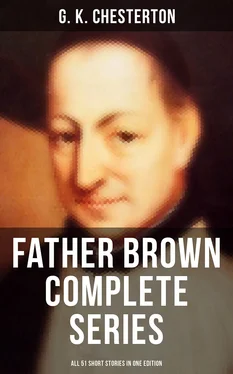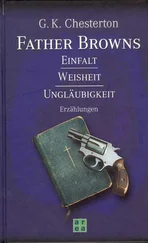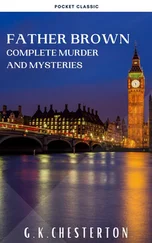"There was one hitch, and it is to the honour of human nature. Evil spirits like Saradine often blunder by never expecting the virtues of mankind. He took it for granted that the Italian's blow, when it came, would be dark, violent and nameless, like the blow it avenged; that the victim would be knifed at night, or shot from behind a hedge, and so die without speech. It was a bad minute for Prince Paul when Antonelli's chivalry proposed a formal duel, with all its possible explanations. It was then that I found him putting off in his boat with wild eyes. He was fleeing, bareheaded, in an open boat before Antonelli should learn who he was.
"But, however agitated, he was not hopeless. He knew the adventurer and he knew the fanatic. It was quite probable that Stephen, the adventurer, would hold his tongue, through his mere histrionic pleasure in playing a part, his lust for clinging to his new cosy quarters, his rascal's trust in luck, and his fine fencing. It was certain that Antonelli, the fanatic, would hold his tongue, and be hanged without telling tales of his family. Paul hung about on the river till he knew the fight was over. Then he roused the town, brought the police, saw his two vanquished enemies taken away forever, and sat down smiling to his dinner."
"Laughing, God help us!" said Flambeau with a strong shudder. "Do they get such ideas from Satan?"
"He got that idea from you," answered the priest.
"God forbid!" ejaculated Flambeau. "From me! What do you mean!"
The priest pulled a visiting-card from his pocket and held it up in the faint glow of his cigar; it was scrawled with green ink.
"Don't you remember his original invitation to you?" he asked, "and the compliment to your criminal exploit? 'That trick of yours,' he says, 'of getting one detective to arrest the other'? He has just copied your trick. With an enemy on each side of him, he slipped swiftly out of the way and let them collide and kill each other."
Flambeau tore Prince Saradine's card from the priest's hands and rent it savagely in small pieces.
"There's the last of that old skull and crossbones," he said as he scattered the pieces upon the dark and disappearing waves of the stream; "but I should think it would poison the fishes."
The last gleam of white card and green ink was drowned and darkened; a faint and vibrant colour as of morning changed the sky, and the moon behind the grasses grew paler. They drifted in silence.
"Father," said Flambeau suddenly, "do you think it was all a dream?"
The priest shook his head, whether in dissent or agnosticism, but remained mute. A smell of hawthorn and of orchards came to them through the darkness, telling them that a wind was awake; the next moment it swayed their little boat and swelled their sail, and carried them onward down the winding river to happier places and the homes of harmless men.
Table of Contents
The little village of Bohun Beacon was perched on a hill so steep that the tall spire of its church seemed only like the peak of a small mountain. At the foot of the church stood a smithy, generally red with fires and always littered with hammers and scraps of iron; opposite to this, over a rude cross of cobbled paths, was "The Blue Boar," the only inn of the place. It was upon this crossway, in the lifting of a leaden and silver daybreak, that two brothers met in the street and spoke; though one was beginning the day and the other finishing it. The Rev. and Hon. Wilfred Bohun was very devout, and was making his way to some austere exercises of prayer or contemplation at dawn. Colonel the Hon. Norman Bohun, his elder brother, was by no means devout, and was sitting in evening dress on the bench outside "The Blue Boar," drinking what the philosophic observer was free to regard either as his last glass on Tuesday or his first on Wednesday. The colonel was not particular.
The Bohuns were one of the very few aristocratic families really dating from the Middle Ages, and their pennon had actually seen Palestine. But it is a great mistake to suppose that such houses stand high in chivalric tradition. Few except the poor preserve traditions. Aristocrats live not in traditions but in fashions. The Bohuns had been Mohocks under Queen Anne and Mashers under Queen Victoria. But like more than one of the really ancient houses, they had rotted in the last two centuries into mere drunkards and dandy degenerates, till there had even come a whisper of insanity. Certainly there was something hardly human about the colonel's wolfish pursuit of pleasure, and his chronic resolution not to go home till morning had a touch of the hideous clarity of insomnia. He was a tall, fine animal, elderly, but with hair still startlingly yellow. He would have looked merely blonde and leonine, but his blue eyes were sunk so deep in his face that they looked black. They were a little too close together. He had very long yellow moustaches; on each side of them a fold or furrow from nostril to jaw, so that a sneer seemed cut into his face. Over his evening clothes he wore a curious pale yellow coat that looked more like a very light dressing gown than an overcoat, and on the back of his head was stuck an extraordinary broad-brimmed hat of a bright green colour, evidently some oriental curiosity caught up at random. He was proud of appearing in such incongruous attires—proud of the fact that he always made them look congruous.
His brother the curate had also the yellow hair and the elegance, but he was buttoned up to the chin in black, and his face was clean-shaven, cultivated, and a little nervous. He seemed to live for nothing but his religion; but there were some who said (notably the blacksmith, who was a Presbyterian) that it was a love of Gothic architecture rather than of God, and that his haunting of the church like a ghost was only another and purer turn of the almost morbid thirst for beauty which sent his brother raging after women and wine. This charge was doubtful, while the man's practical piety was indubitable. Indeed, the charge was mostly an ignorant misunderstanding of the love of solitude and secret prayer, and was founded on his being often found kneeling, not before the altar, but in peculiar places, in the crypts or gallery, or even in the belfry. He was at the moment about to enter the church through the yard of the smithy, but stopped and frowned a little as he saw his brother's cavernous eyes staring in the same direction. On the hypothesis that the colonel was interested in the church he did not waste any speculations. There only remained the blacksmith's shop, and though the blacksmith was a Puritan and none of his people, Wilfred Bohun had heard some scandals about a beautiful and rather celebrated wife. He flung a suspicious look across the shed, and the colonel stood up laughing to speak to him.
"Good morning, Wilfred," he said. "Like a good landlord I am watching sleeplessly over my people. I am going to call on the blacksmith."
Wilfred looked at the ground, and said: "The blacksmith is out. He is over at Greenford."
"I know," answered the other with silent laughter; "that is why I am calling on him."
"Norman," said the cleric, with his eye on a pebble in the road, "are you ever afraid of thunderbolts?"
"What do you mean?" asked the colonel. "Is your hobby meteorology?"
"I mean," said Wilfred, without looking up, "do you ever think that God might strike you in the street?"
"I beg your pardon," said the colonel; "I see your hobby is folk-lore."
"I know your hobby is blasphemy," retorted the religious man, stung in the one live place of his nature. "But if you do not fear God, you have good reason to fear man."
The elder raised his eyebrows politely. "Fear man?" he said.
"Barnes the blacksmith is the biggest and strongest man for forty miles round," said the clergyman sternly. "I know you are no coward or weakling, but he could throw you over the wall."
Читать дальше












